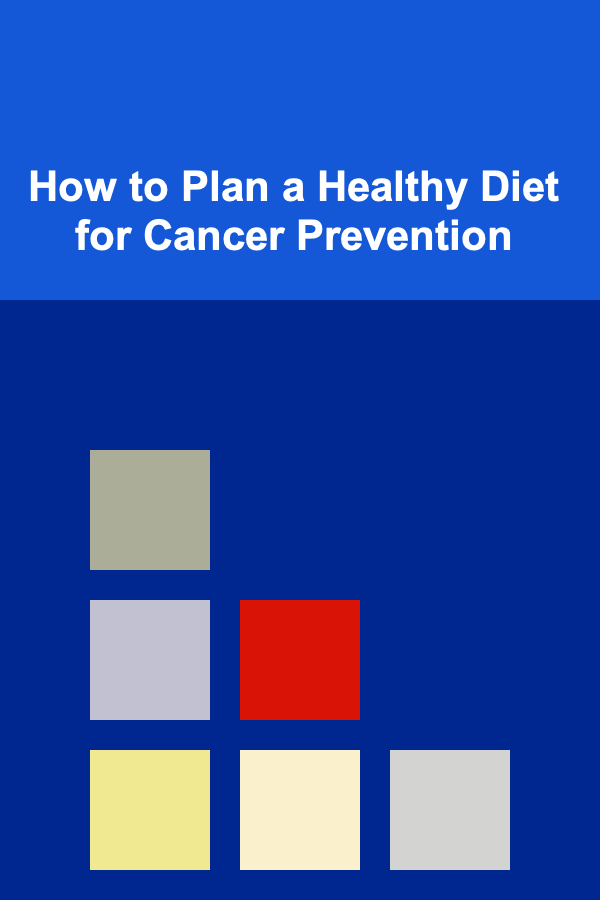
How to Plan a Healthy Diet for Cancer Prevention
ebook include PDF & Audio bundle (Micro Guide)
$12.99$6.99
Limited Time Offer! Order within the next:

Cancer is a complex and multifactorial disease that arises from the uncontrolled growth of abnormal cells in the body. It is one of the leading causes of death worldwide, and although it is not always preventable, lifestyle choices, particularly diet, play a crucial role in reducing the risk of developing cancer. A healthy diet can support overall well-being, strengthen the immune system, and protect against the development of certain cancers. This article explores how to plan a diet that supports cancer prevention, focusing on the foods and nutrients that contribute to long-term health.
The Role of Diet in Cancer Prevention
Dietary habits have long been linked to the risk of cancer. According to numerous studies, the types of food you consume, along with your overall eating pattern, can influence the likelihood of developing certain types of cancer. While some factors such as genetics and environmental exposures cannot be controlled, diet is one area where individuals have significant power to make preventative choices.
A well-balanced diet can contribute to cancer prevention by:
- Strengthening the immune system, making it more efficient in detecting and eliminating abnormal cells.
- Reducing inflammation, which is a key factor in the development of many types of cancer.
- Preventing obesity, which is linked to an increased risk of several types of cancer.
- Supporting healthy digestion and nutrient absorption, reducing the risk of gastrointestinal cancers.
- Providing antioxidants and other protective compounds that can help repair cellular damage.
To develop a cancer-preventive diet, one needs to focus on foods that are rich in nutrients, fiber, and antioxidants, while limiting the intake of processed and inflammatory foods.
Key Dietary Components for Cancer Prevention
1. Fruits and Vegetables: The Powerhouses of Prevention
Fruits and vegetables are essential components of a cancer-prevention diet. These foods are packed with vitamins, minerals, fiber, and phytonutrients (plant compounds) that have been shown to support immune function and inhibit cancer cell growth.
Cruciferous Vegetables
Cruciferous vegetables like broccoli, cauliflower, kale, Brussels sprouts, and cabbage contain compounds known as glucosinolates. These compounds have been shown to possess anticancer properties by supporting detoxification processes in the liver and neutralizing carcinogens in the body. Studies have demonstrated that regular consumption of cruciferous vegetables can lower the risk of colorectal, lung, and prostate cancers.
Berries and Citrus Fruits
Berries such as strawberries, blueberries, raspberries, and blackberries are high in antioxidants, particularly vitamin C and flavonoids. These antioxidants help neutralize free radicals, which are unstable molecules that can cause cellular damage and promote cancer. Citrus fruits like oranges, lemons, and grapefruits are also rich in vitamin C and other bioactive compounds, which have been linked to a reduced risk of cancers, especially of the mouth, throat, and esophagus.
Leafy Greens
Leafy greens such as spinach, collard greens, and Swiss chard are rich in vitamins A, C, and K, as well as folate, all of which contribute to cancer prevention. These vegetables also contain chlorophyll, a pigment known to bind to carcinogenic substances and reduce their absorption by the body.
2. Whole Grains and Fiber: Supporting Digestive Health
Whole grains like oats, quinoa, brown rice, and whole wheat are rich in fiber, which plays a crucial role in cancer prevention. Fiber is important for digestive health because it helps regulate bowel movements and supports the elimination of waste products from the body. Studies have shown that individuals who consume a diet high in fiber have a lower risk of colorectal cancer.
Fiber also helps control blood sugar levels, which is essential for maintaining a healthy weight. Obesity is a known risk factor for several cancers, including breast, colorectal, and endometrial cancers. By maintaining a healthy weight through fiber-rich foods, you can significantly reduce your cancer risk.
3. Healthy Fats: Omega-3 Fatty Acids and Monounsaturated Fats
Healthy fats are an important part of a cancer-preventive diet. They help reduce inflammation in the body, which is a key factor in cancer development. Omega-3 fatty acids, in particular, have been shown to inhibit the growth of cancer cells and reduce inflammation. These fats are found in fatty fish such as salmon, mackerel, and sardines, as well as in plant-based sources like flaxseeds, chia seeds, and walnuts.
Monounsaturated fats, which are found in olive oil, avocados, and nuts, also have anti-inflammatory effects. Replacing unhealthy fats, such as trans fats and saturated fats, with healthier options can support overall health and reduce cancer risk.
4. Proteins: The Importance of Plant-Based Sources
Protein is essential for the growth and repair of tissues in the body, and certain types of protein sources are better for cancer prevention than others. Red meat and processed meats, such as bacon, sausages, and hot dogs, have been linked to an increased risk of colorectal cancer and other cancers. This is partly due to the presence of carcinogenic compounds formed during cooking or processing.
Plant-based protein sources, such as beans, lentils, tofu, and quinoa, are a healthier alternative. These foods provide protein without the saturated fat and carcinogens associated with animal products. Additionally, plant-based diets are typically rich in fiber, antioxidants, and other cancer-preventive nutrients.
Fish, especially fatty fish like salmon and sardines, is also a great source of protein that contains beneficial omega-3 fatty acids. When consuming animal products, it's important to opt for lean cuts and organic, grass-fed options to minimize exposure to harmful substances like hormones and antibiotics.
5. Spices and Herbs: Nature's Antioxidants
Certain herbs and spices contain powerful antioxidants and anti-inflammatory compounds that can aid in cancer prevention. Some of the most promising spices include:
- Turmeric: The active compound in turmeric, curcumin, has been extensively studied for its anti-inflammatory and anticancer properties. Curcumin has been shown to inhibit the growth of cancer cells and enhance the effectiveness of certain chemotherapy drugs.
- Garlic: Garlic contains sulfur compounds, such as allicin, that have been found to slow the growth of cancer cells and boost the immune system.
- Ginger: Like turmeric, ginger has potent anti-inflammatory properties. It also contains compounds that can help prevent the spread of cancer cells and reduce nausea caused by chemotherapy.
- Green Tea: Green tea is rich in catechins, which are antioxidants that can help prevent cancer by protecting cells from oxidative damage and inhibiting the growth of cancer cells.
6. Limit Processed Foods, Sugars, and Alcohol
While it's important to focus on cancer-preventive foods, it's equally essential to limit or avoid certain substances that can increase the risk of cancer.
Processed Foods
Processed foods, including fast food, sugary snacks, and packaged meals, often contain unhealthy fats, excess sugar, and sodium. These foods can contribute to inflammation and weight gain, both of which increase cancer risk. They may also contain preservatives, additives, and chemicals that have been linked to cancer development.
Sugars
Excessive sugar consumption can lead to weight gain and increased fat storage in the body. Obesity is a significant risk factor for various cancers, including breast, prostate, and colon cancer. Additionally, high sugar intake can lead to higher insulin levels, which can promote the growth of cancer cells. It's important to limit the consumption of sugary drinks, candies, and processed sweets.
Alcohol
Excessive alcohol consumption has been linked to an increased risk of several types of cancer, including mouth, throat, liver, and breast cancer. Alcohol can damage the DNA in cells, promoting the development of cancer. Limiting alcohol intake or avoiding it altogether can significantly reduce cancer risk.
Developing a Cancer-Prevention Meal Plan
To create a cancer-preventive diet, it's important to incorporate a wide variety of nutrient-dense foods that offer protective benefits. Below is a sample meal plan that follows the principles of cancer prevention:
Breakfast:
- Oatmeal with fresh berries (blueberries, raspberries) and ground flaxseeds.
- A side of green tea for its antioxidant properties.
Lunch:
- A large salad with mixed leafy greens (spinach, kale, arugula), cherry tomatoes, avocado, and chickpeas. Dress with olive oil and lemon juice.
- A side of whole-grain bread or quinoa.
Dinner:
- Grilled salmon with a turmeric and garlic marinade.
- Steamed broccoli and roasted sweet potatoes.
- A glass of water with a slice of lemon.
Snacks:
- A handful of almonds or walnuts.
- Carrot sticks with hummus.
- A piece of dark chocolate (70% cocoa or higher).
Tips for Success:
- Focus on variety: The more diverse your diet, the more likely you are to obtain all the essential nutrients that promote health.
- Eat the rainbow: Consuming a wide range of colorful fruits and vegetables ensures that you get a variety of phytonutrients and antioxidants.
- Plan ahead: Preparing meals in advance can help you stick to your cancer-preventive diet and avoid the temptation of unhealthy foods.
Conclusion
Planning a healthy diet for cancer prevention involves choosing whole, nutrient-dense foods and minimizing processed, sugary, and inflammatory foods. By focusing on fruits, vegetables, whole grains, healthy fats, and plant-based proteins, you can significantly reduce your risk of developing cancer and improve your overall health. In addition to a balanced diet, other lifestyle factors, such as regular exercise, adequate sleep, and stress management, can further support cancer prevention and enhance your quality of life. While diet alone cannot guarantee that cancer will be avoided, it is one of the most effective strategies for reducing your risk and promoting longevity.

How to Integrate Smart Home Devices for Convenience
Read More
How to Maintain Your Home's Windows for Energy Efficiency
Read More
How to Organize Your Home Office Supplies Like a Pro
Read MoreHow to Use a 529 Contribution Tracker to Plan for Future Education Expenses
Read More
10 Tips for Using Color-Coding to Organize Your Project To-Do List
Read More
10 Tips for Finding Hidden Gems at Estate Sales
Read MoreOther Products

How to Integrate Smart Home Devices for Convenience
Read More
How to Maintain Your Home's Windows for Energy Efficiency
Read More
How to Organize Your Home Office Supplies Like a Pro
Read MoreHow to Use a 529 Contribution Tracker to Plan for Future Education Expenses
Read More
10 Tips for Using Color-Coding to Organize Your Project To-Do List
Read More